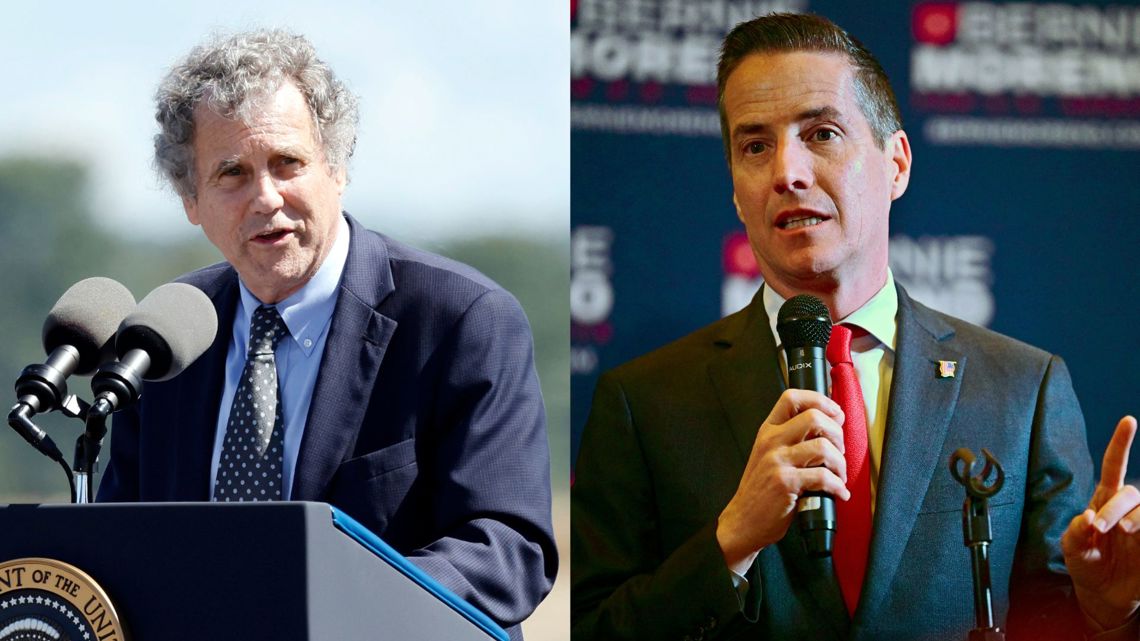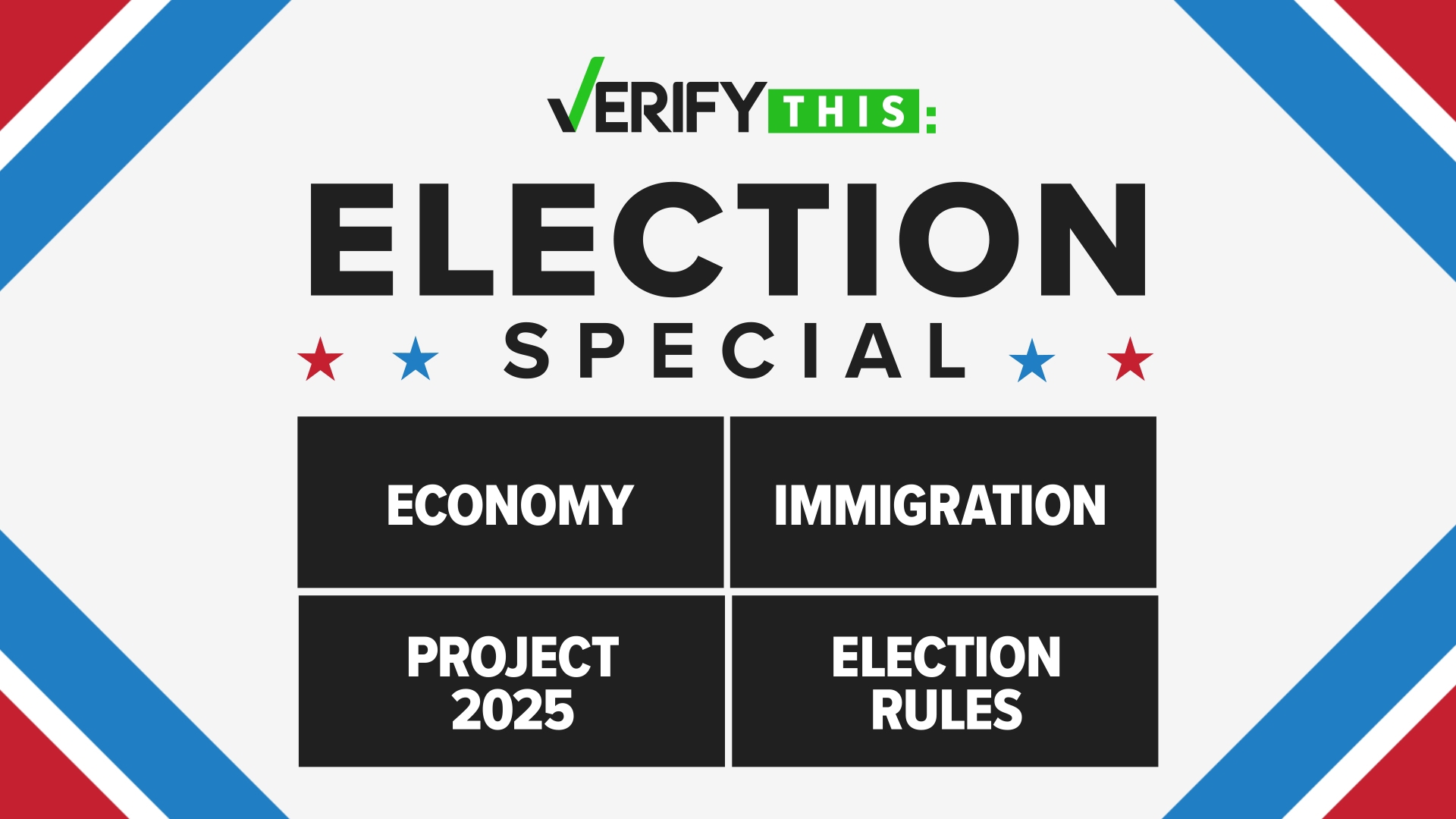COLUMBUS, Ohio — On Nov. 5, millions of voters across the country will make their voices heard through the general election ballot.
Up for a vote this year is the presidential race between Republican candidate Donald Trump and Democratic candidate Kamala Harris. Trump and Harris have been traveling across the country campaigning for the last few months in an attempt to gain support and win the presidential vote.
While that race will appear on ballots nationwide, Ohioans will have some other key issues and races to vote on. You can view what will be on your specific ballot here.
In this voter guide you'll find:
- What's on the ballot
- Registration information and deadlines
- When polls open and close
- Polling locations
- Ohio voter ID requirements
📺 10TV+ ELECTION SPECIAL: From the latest electoral count in the presidential race to local races and issues in central Ohio, we’re bringing you live coverage election night starting at 7:30 p.m. on 10TV+, 10TV.com, the 10TV News app, and YouTube.
The best way to watch this election special is on a big screen via the free 10TV+ streaming platform, available on Roku, Amazon Fire TV and Apple TV.
What’s on the ballot?


Former President Donald Trump is going up against Vice President Kamala Harris in the presidential race.
In her campaign, Harris has taken the approach of exciting and organizing the diverse Democratic base, especially younger generations, nonwhite voters and women, while convincing moderate Republicans who dislike Trump that they should be comfortable with her in the Oval Office, some policy disagreements notwithstanding. That’s the same formula Biden used in defeating Trump four years ago, flipping traditionally GOP-leaning states like Arizona and Georgia and narrowing the gap in North Carolina.
Trump, meanwhile, appears to bet that his path back to the White House depends mostly on his core supporters, plus enough new support from working- and middle-class voters drawn to his promises of tax breaks.
The two candidates debated each other in September, you can read highlights from the debate here.
U.S. Senate race


Democratic incumbent Sherrod Brown and Republican businessman Bernie Moreno are competing for the U.S. Senate seat to represent the state of Ohio.
With Democrats holding a tenuous 51-49 voting majority in the Senate but defending more seats than Republicans, Brown’s seat is expected to be a top GOP target. He is the lone Democrat holding a non-judicial statewide office in Ohio, a state that has moved steadily to the right during the Trump era.
The constitutional amendment aims to replace the current Ohio Redistricting Commission, made up of three statewide officeholders and four state lawmakers, with an independent body selected directly by citizens. The new panel’s members would be diversified by party affiliation and geography.
The effort follows the existing structure’s repeated failure to produce constitutional maps. During the protracted process for redrawing district boundaries to account for the results of the 2020 Census, challenges filed in court resulted in two congressional maps and five sets of Statehouse maps being rejected as unconstitutionally gerrymandered.
Justice of Supreme Court
There are six different candidates for the Ohio Supreme Court running for three different races. Depending on the outcome of this race, the court could be under a Democratic majority. Republicans currently have a 4-3 majority.
- Megan E. Shanahan (R) vs Michael P. Donnelly (D)
- Melody Stewart (D) vs Joseph T. Deters (R)
- Daniel R. Hawkins (R) vs Lisa Forbes (D)
School levies
The proposal calls for an initial 5 mill tax, followed by annual increases of 2.5 mills in years two through five, spanning from 2025-2029, according to the district. The proposed levy would fund daily, current operational expenses and maintain current academic offerings and student services.
As the buildings in the district near capacity, leaders have put a 4.46 mill bond levy on the ballot to provide funding for a new high school and other district projects. The district is seeking a $100 million bond issue. The projected levy is estimated to cost a Buckeye Valley homeowner $156 annually per $100,000 of assessed property value.
The Board of Education voted to place a $69.5 million bond issue on the ballot, which would go toward the construction of a new Stevenson Elementary School and improvements to the district's K-12 athletic complex. According to the district, the proposed project would be approximately 6.95 mills, equal to $243 per $100,000 of property valuation annually.
The proposed bond issue would provide the district with $78.3 million to construct, improve, furnish and equip three new middle schools and an addition to Groveport Madison High School if passed. The cost to homeowners whose house has an appraised value of $100,000 would be 23.4 cents per day.
The 6.9 mill operating levy would generate funds for the day-to-day management of the district, like staffing, utilities and supplies. The bond issue would authorize the school district to issue $142 million in funding to replace and build three elementary schools, an additional preschool center, adding a third building for sixth graders and district-wide safety upgrades.
The district aims to secure funding through a bond issue to construct a new K-8 building. The district is requesting 4.3 mills, which equates to $151 per $100,000 of the council auditor's appraised value.
Voters in Marysville can expect to see a 5.5 mill emergency levy on the ballot on Election Day. Superintendent Diane Allen and the district’s treasurer, Todd Johnson said it would generate around $6.4 million annually, and allow the district to sustain its operations in the next five years. Read more about the levy here.
Voters in Reynoldsburg will vote on a 6.65 mill emergency levy placed on the ballot by school leaders.
District leaders say it began deficit spending in fiscal year 2023, meaning the district was spending more money than it brought in. Dr. Tracy Reed, superintendent of Reynoldsburg City Schools, said the district is putting the levy on the ballot because ESSER funds are running out for essential programs.
The levy will cost $233 per year per $100,000 of property value. For example, if your home costs $300,000, you’ll pay almost $700 a year.
The money would be used for constructing school facilities and renovating, improving and constructing additions to buildings. The ballot measure does not specify what schools would be improved. The ballot measure states that the bonds would be up to $140 million that would be repaid annually over a maximum of 37 years.
The measure also includes two levies. One of them, a 1.66 mill levy, would amount to $58 for each $100,000 of the appraised value. It would help pay the annual debt charges on the bonds. The second levy, 4.9 mills, would pay for current operating expenses, according to the ballot measure. It would cost Westerville residents $172 for each $100,000 of the appraised value. Read more on the bond, tax levies here.
Other bonds/levies on the ballot
Central Ohio Transit Authority
COTA will have a levy on the ballot that will be an $8 billion investment in transit throughout central Ohio. The levy is a sales tax initiative. If it passes, it will increase the sales tax in Columbus from 7.5% to 8%. Then COTA would receive 1% of that sales tax. Currently, it receives .5%. You can read more about the levy here.
Genoa Township
Roads and bridges levy
Voters in Genoa Township will be voting on a couple of levies in the upcoming election. One is the roads and bridges levy, which is brought to voters every five years. Voters will consider a replacement and decrease of the levy at a rate of 1.89 mills, which amounts to $66 per year for each $100,000 of the county auditor's appraised value. This allows for maintenance and repairs to be done to the roads.
Fire levy
Also on the ballot will be a fire and EMS levy. Voters will decide whether or not to approve a continuous levy at a rate of 7.0 mills, amounting to $245 for each $100,000 valuation. This will go toward funding increases in operating expenses for the fire department.
Plain Township
Plain Township Fire Chief Patrick Connor said his department needs to replace a fire engine, which will cost $1 million. They are asking for a levy, which would mean an additional $105 per $100,000 of home value. Connor said it would be the lowest levy in Franklin County. Read more on the levy here.
As Nov. 5 draws near, there are several deadlines for voters to mark on their calendars.
How to check your voter registration status
Through the Secretary of State’s website, Ohioans can enter their first and last names and county of residency to check their registration status. If you’re registered, a polling location and other local information will be provided.
Absentee voting deadlines
Those planning on voting absentee must request a ballot. Voters have until seven days before the election to request a ballot. These are the first votes counted on election night. If mailed, these ballots must be postmarked by the day before the election in order to be counted. Those returning it in person to a county board of election must do so before the close of the polls on Election Day.
Military and overseas absentee voting will be available beginning Sept. 20. Absentee voting by mail will start on Oct. 8.
When do polls open and close?
Polls will be open from 6:30 a.m. to 7:30 p.m.
Where do I go to vote?
Voters can find their polling location and ballots here: ohiosos.gov/elections/voters/toolkit/polling-location/
OHIO VOTER ID REQUIREMENTS
Valid types of photo identification include:
Ohio driver's license
State of Ohio ID card
Interim ID form issued by the Ohio BMV
US passport
US passport card
US military ID card
Ohio National Guard ID card
US Department of Veterans Affairs ID card
All photo IDs must have an expiration date that has not passed.
What if you forget your ID on Election Day? You will still be able to vote using a provisional ballot. For that ballot to be counted, you must return to the board of elections no later than four days following Election Day to provide a qualifying form of identification.
Ohio law prohibits acceptance of the following forms of ID:
Out-of-state driver’s license or photo ID
Social Security card
Birth certificate
Insurance card
Utility bill
Bank statement
Government check
Paycheck
Other government document
Any registration acknowledgment notice from the county board of elections

